Advocacy
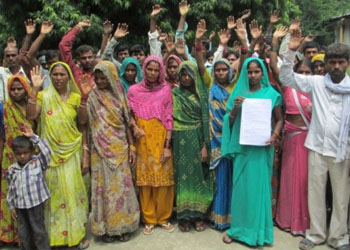
The rural village of Khalifapur was totally neglected by all government programs and development. A local gang regularly attacked residents, causing families to migrate. No one wanted to deal with this place, until the Community Development Team from Broadwell Christian Hospital stepped in. The team encouraged the residents to unite and apply for village improvements. An action plan was made, and the applications were turned in.
Then a meeting with a local leader was organized, and he agreed to support the people. As the staff planned the advocacy action of the group, the community stepped up and presented their village issues to the district administration. The local media picked up the story, and this opened the eyes of the government authorities to the need for improvements in roads, drainage, electric service, and safe drinking water for Khalifapur.
Thanks to the efforts of EHA’s team advocating with the villagers in seeking help, projects for road construction, drainage work, and water hand pump installation have been completed. The media has begun highlighting other sanitation issues in nearby project areas, and the people of Khalifapur are proud to share their experiences with others.
Advocacy Brings Road Improvement
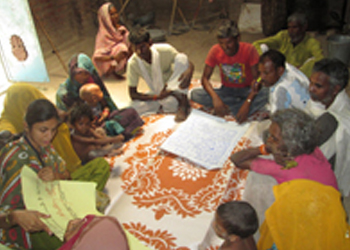

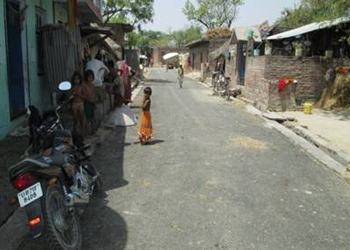
Jairampur is a village in North India. As with many of these places, it is a remote town lacking basic infrastructure and electricity. New development in the village stopped in the 1960s.
Providing advocacy is one of the many functions of EHA’s Community Health and Development Projects (CHDP). Often poor people in rural areas have no idea what programs or benefits they are eligible to take advantage of. The Broadwell Christian Hospital CHDP team met with a group in Jairampur that wanted to see some changes. They formed a Health Care Committee (pictured to the left) and determined to find some solutions, starting with the roadways and drainage system.
During the rainy season, several areas in town became severely water logged and unsafe for travel. The CHDP staff suggested that they apply to the municipality for a road. When the committee had arranged a meeting with the municipality leaders, they asked the CHDP staff to participate with them. After the meeting, the committee was encouraged to put in an application for a road, which they did. After several more layers of bureaucracy, each requiring its own application, the committee finally got the government officials to come and approve their request for a road. Throughout this process, the CHDP staff walked the committee through the red tape and paperwork.
Beginning the work of road construction required tearing down a number of illegal walls and structures that had been built by the slum dwellers in the area. Once the committee members explained to these residents the benefits of the road and drainage systems, they cooperated fully. Now the community members understand that if they work together in unity, and persevere through the difficulties, they can achieve their goal of a better environment.
Improving Villagers’ Quality of Life
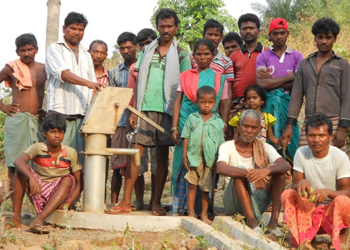
Often they don’t even know what they’re missing. They live hand-to-mouth, just trying to get through each day, without even a clean water source. They literally live in survival mode. In the remote villages of Jharkhand in northern India, these Malto tribal villagers battle preventable infectious diseases, live with no electricity, and suffer from high infant and mother mortality rates.
Prem Jyoti Community Hospital has begun a number of Community-Based Organizations in 40 villages to address these concerns. When they came to Bedotigra, a mountaintop village, the team members began to train the villagers, helping them to understand that changes must start with them. Water was a scarcity and they were collecting it from a distant source. A year before this, a bore well near the village had been partially completed, so the team helped these villagers fight for their right of access to clean water. They filed an application with the proper authorities, which was the first time they had ever combined efforts to have this need addressed. Before long, the hand pump fittings and pipes were brought in and installed. These villagers have learned an important lesson — they can bring changes to their village by working together and speaking up.
They are beginning to take on tasks like advocating for electricity (successful in three villages so far) and making their village schools functional. The next topic that will be addressed by the CBO teams is health issues — especially mother and child health — and what initiatives they could take up to prevent them.
Advocacy Explains Insurance
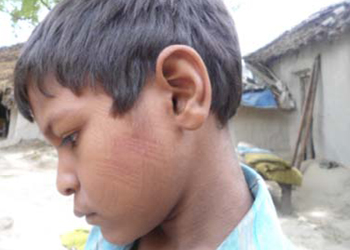
Sometimes advocacy is the biggest thing EHA can provide to a struggling family. Often aid in one form or another is available from the government, but poor Indians lack the knowledge or skills to access it.
One father was desperately seeking help for his 8-year-old son, who had a discharge from his ear for many days. He tried various doctors and medicines to no avail. For some time he shied away from the operation that was recommended to him because he knew he didn’t have the money to afford it.
When the community health team from Kachhwa Christian Hospital went to his village to speak about the RSBY Health Insurance Smart Card, Ramashankar approached them regarding his son’s illness. He told them that he had an RSBY smart card but wasn’t sure how to use it. This card is for people below the poverty line to use for medical expenses. Patients’ cards are swiped at the hospital, and their bills are paid by a joint government/private sector health insurance company. The team explained this card’s use and encouraged Ramashankar to enjoy its benefits free of cost.
So he took his son, Pankaj, to the hospital for an operation and his ear was healed. Upon seeing the community team again, Ramashankar expressed gratitude to them for helping him seek medical care for his son under the insurance card. Recently the team conducted other health awareness programs near his home, and he and his son participated enthusiastically, excited to share their experience of joy and hope.
Villagers Gain Rights and Respect
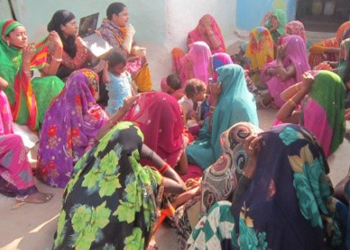
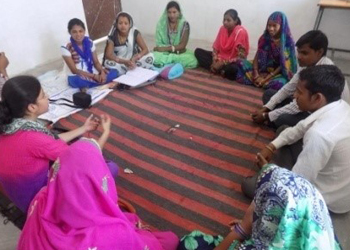
The tiny village of Bhagwantpura is mostly made up of Dalits (untouchables), but they have always been dominated by the high caste Thakurs. The Dalits have been deprived of their rights for decades, including healthcare. Their access to government officials was limited by those of higher caste, and any government funds sent to the village were siphoned off by the upper castes. The Dalits believed that nothing good could ever happen in their little village.
The village was supposed to have a health facility called the Anganwadi Center, but the leader was supported by the upper castes, so there was no care for the Dalits. Into this challenging situation came the community health ieam from Chhatarpur Christian Hospital. They began to build relationships with community members, village leaders, and village level health workers. Initially, there was a backlash from the upper caste, but over time, two mothers groups and a mother and child health forum were begun.
These groups began discussing the poor health situation and facilities in the village. Since there was no building available, government midwives began administering immunizations under a tree. The mother and child health forum secretary took the initiative to report the lack of an Anganwadi health center to the authorities. After investigation, the authorities fired the upper caste manager of the center and appointed a forum member from the Dalit community to run it. Initially, his life was threatened by the Thakurs and he had to leave the village for two weeks, but the community health workers and villagers supported him, and he was able to return.
Together, these support groups requested that the district authority provide them with a building for medical care. Temporarily, they were given use of part of the government school building while a new building could be readied. Now the village children are getting the care they need and babies are being delivered safely, dropping the infant mortality rate from four to zero. But more than all this, the Dalits have overcome their fear of the upper castes which has been ingrained in them for centuries. The Thakurs have finally lost their stranglehold on the village, and everyone has equal opportunity for health care.
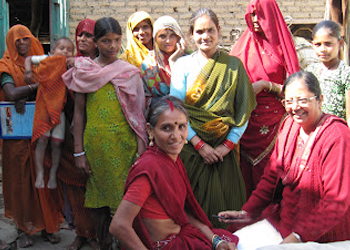
About Advocacy
Living in poverty can be lonely and isolating. For many people, it’s enough of a challenge just trying to survive from one day to the next, often with no electricity or clean water, just hoping to find enough food for the day. It can sometimes feel like every man for himself.
EHA helps push against that isolation by working toward advocacy for villages in need. Rural villages often feel totally neglected by a government that feels far off, but the truth is that there are often government programs in place that can help. Often the bigger problem is that they don’t even know to ask for the help.
Advocacy helps unite residents together to speak up as a means of bringing change. By working together, they can have a voice that is heard. Together, villagers can seek help from the government and find aid that helps with community infrastructure, clean water, and new roads.
Individuals are also aided by EHA staff when there are benefits the person needs to apply for, such as a widow’s pension or disability aid. Often times, these government benefits make all the difference between struggling through life and having one’s basic needs met.
EHA community staff make a tremendous difference in the lives of individuals and the functioning of communities. Knowing what’s there for the asking is key.
